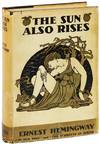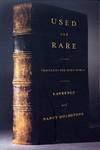

Stock Photo: Cover May Be Different
How to Read and Why
by Bloom, Harold
- Used
- Very Good
- Hardcover
- Signed
- first
- Condition
- Very Good/Very good
- ISBN 10
- 0684859068
- ISBN 13
- 9780684859064
- Seller
-
Silver Spring, Maryland, United States
Payment Methods Accepted
About This Item
New York, N.Y.: Scribner, 2000. First Printing [Stated]. Hardcover. Very good/Very good. Katherine Newbegin (Author Photograph). 283, [5] pages. Signed by the author on the title page. Includes Preface and Prologue: Why Read? Contains sections on Short Stories; Poems; Novels, Part 1; Plays; and Novels Part 2. Also contains an Epilogue: Completing the Work. Harold Bloom (July 11, 1930 - October 14, 2019) was an American literary critic and the Sterling Professor of Humanities at Yale University. He is often cited as the most influential English-language critic of the late 20th century. Following the publication of his first book in 1959, Bloom wrote more than 50 books, including 20 books of literary criticism, several books discussing religion, and a novel. During his lifetime, he edited hundreds of anthologies concerning numerous literary and philosophical figures for the Chelsea House publishing firm. Bloom's books have been translated into more than 40 languages. Bloom was a defender of the traditional Western canon at a time when literary departments were focusing on what he derided as the "school of resentment" (multiculturalists, feminists, Marxists, neoconservatives, and others). He was educated at Yale University, the University of Cambridge, and Cornell University. Bloom was a member of the Yale English Department from 1955 to 2019, teaching his final class four days before his death. He received a MacArthur Fellowship in 1985. From 1988 to 2004, Bloom was Berg Professor of English at New York University while maintaining his position at Yale. In 2010, he became a founding patron of Ralston College, a new institution in Savannah, Georgia, which focuses on primary texts. "Information is endlessly available to us; where shall wisdom be found?" is the crucial question with which renowned literary critic Harold Bloom commences this impassioned book on the pleasures and benefits of reading well. For more than forty years, Bloom has transformed college students into lifelong readers with his unrivaled love for literature. Shedding all polemic, Bloom addresses the solitary reader, who, he urges, should read for the purest of all reasons: to discover and augment the self. Always dazzling in his ability to draw connections between texts across continents and centuries, Bloom instructs readers in how to immerse themselves in the different literary forms. Probing discussions of the works of beloved writers such as William Shakespeare, Ernest Hemingway, Jane Austen, Walt Whitman, Emily Dickinson, Charles Dickens, and William Faulkner highlight the varied challenges and delights found in short stories, poems, novels, and plays. Bloom not only provides illuminating guidance on how to read a text but also illustrates what such reading can bring--aesthic pleasure, increased individuality and self-knowledge, and the lifetime companionship of the most engaging and complex literary characters. Derived from a Kirkus review: The prolific critic Bloom has courted controversy in the last few years with his denunciations of the politically correct "School of Resentment" that now dominates most universities-and he has not been discreet in his attacks on many of the writers that this school holds in highest esteem. Here, he carries his arguments to an even more fundamental level, demanding that we consider what the point and purpose of literature can be in an age where information has gone far beyond the verbal forms in which literature subsides. "Information is endlessly available to us," he points out, "where shall wisdom be found?" Naturally, Bloom finds it in the great writers of the Western tradition, and he proceeds to tell us just how great they are-and why. Bloom's insights into just about anything can be worth all of his postures.
Reviews
(Log in or Create an Account first!)
Details
- Bookseller
- Ground Zero Books
(US)
- Bookseller's Inventory #
- 81270
- Title
- How to Read and Why
- Author
- Bloom, Harold
- Illustrator
- Katherine Newbegin (Author Photograph)
- Format/Binding
- Hardcover
- Book Condition
- Used - Very Good
- Jacket Condition
- Very good
- Quantity Available
- 1
- Edition
- First Printing [Stated]
- ISBN 10
- 0684859068
- ISBN 13
- 9780684859064
- Publisher
- Scribner
- Place of Publication
- New York, N.Y.
- Date Published
- 2000
- Keywords
- Books, Reading, Turgenev, Chekhov, de Maupassant, Ernest Hemingway, Flannery O'Connor, Nabokov, Walt Whitman, Cervantes, Dickens, Dostoevsky, Shakespeare, Oscar Wilde, Melville, Faulkner, Pynchon, Katherine Newbegin
Terms of Sale
Ground Zero Books
Books are offered subject to prior sale. Satisfaction guaranteed. If you notify us within 7 days that you are not satisfied with your purchase, we will refund your purchase price when you return the item in the condition in which it was sold.
About the Seller
Ground Zero Books
Biblio member since 2005
Silver Spring, Maryland
About Ground Zero Books
Founded and operated by trained historians, Ground Zero Books, Ltd., has for over 30 years served scholars, collectors, universities, and all who are interested in military and political history.
Much of our diverse stock is not yet listed on line. If you can't locate the book or other item that you want, please contact us. We may well have it in stock. We welcome your want lists, and encourage you to send them to us.
Much of our diverse stock is not yet listed on line. If you can't locate the book or other item that you want, please contact us. We may well have it in stock. We welcome your want lists, and encourage you to send them to us.
Glossary
Some terminology that may be used in this description includes:
- Title Page
- A page at the front of a book which may contain the title of the book, any subtitles, the authors, contributors, editors, the...

